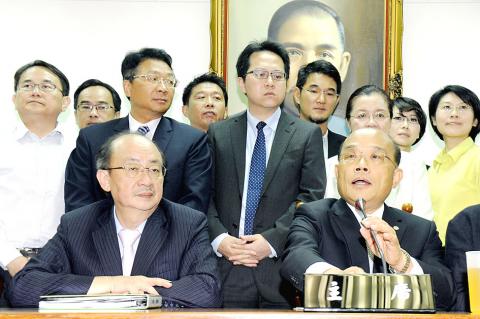Premier Jiang Yi-huah (江宜樺) yesterday gave his full support to President Ma Ying-jeou’s (馬英九) handling of the “influence peddling” case against Wang Jin-pyng (王金平) and said the Cabinet would sustain its backing even if this impeded legislative operations.
Maintaining the judicial system’s independence is “a matter of principle,” Jiang said, adding that: “We [the Cabinet] are already mentally prepared for legislative turmoil.”
Jiang made the comments a day after Ma issued a strongly worded statement denouncing Wang’s alleged meddling in judicial affairs as the “most serious infringement” in the nation’s history.

Photo: Chen Chih-chu, Taipei Times
Ma’s severe condemnation has ignited speculation that Wang, a legislator-at-large with the Chinese Nationalist Party (KMT), of which the president is chairman, could lose his position if the KMT suspends his membership or expels him from the party.
Wang stands accused by the Special Investigation Division of the Supreme Prosecutors’ Office of illegally lobbying for Democratic Progressive Party legislative caucus whip Ker Chien-ming (柯建銘) in a breach of trust case by urging then-minister of justice Tseng Yung-fu (曾勇夫) and Taiwan High Prosecutors’ Office Head Prosecutor Chen Shou-huang (陳守煌) to use their influence to stop a prosecutor from appealing Ker’s not-guilty verdict.
Wang, a 38-year veteran of the legislature, has occupied his current post since 1999. The 72-year-old speaker has good rapport with fellow lawmakers from both the ruling and opposition camps.
The KMT is scheduled to hold a disciplinary committee meeting to rule on Wang’s membership tomorrow, a day after he is to return to Taiwan from a trip abroad. Wang is expected to arrive at 7:20pm.
Jiang said he was present at a meeting on Sunday afternoon in which Ma was putting the finishing touches on his statement and that Vice President Wu Den-yih (吳敦義) also attended.
“President Ma was determined about his stance before he discussed the statement with us,” Jiang said.
The reason Ma set a strong tone in the statement was that Wang’s alleged misconduct crossed the president’s “red line,” Jiang said.
Jiang said that “the judiciary is the last line of defense for justice” in society and has “no gray areas.”
Separately, Control Yuan President Wang Chien-shien urged Wang Jin-pyng to resign on his own accord if the allegations against him are proven to be true.
Wang Chien-shien said he expected the KMT committee to impose severe disciplinary action on the legislative speaker.
“Otherwise, the KMT will be finished. The KMT has to do take action against Wang Jin-pyng that will serve as a deterrent to potential influence peddlers,” he said.
Wang Chien-shien also called for Ker to resign if it was proven that he had asked Wang Jin-pyng to do lobby the prosecutor on his behalf.
Additional reporting by CNA

SECURITY: As China is ‘reshaping’ Hong Kong’s population, Taiwan must raise the eligibility threshold for applications from Hong Kongers, Chiu Chui-cheng said When Hong Kong and Macau citizens apply for residency in Taiwan, it would be under a new category that includes a “national security observation period,” Mainland Affairs Council (MAC) Minister Chiu Chui-cheng (邱垂正) said yesterday. President William Lai (賴清德) on March 13 announced 17 strategies to counter China’s aggression toward Taiwan, including incorporating national security considerations into the review process for residency applications from Hong Kong and Macau citizens. The situation in Hong Kong is constantly changing, Chiu said to media yesterday on the sidelines of the Taipei Technology Run hosted by the Taipei Neihu Technology Park Development Association. With

CARROT AND STICK: While unrelenting in its military threats, China attracted nearly 40,000 Taiwanese to over 400 business events last year Nearly 40,000 Taiwanese last year joined industry events in China, such as conferences and trade fairs, supported by the Chinese government, a study showed yesterday, as Beijing ramps up a charm offensive toward Taipei alongside military pressure. China has long taken a carrot-and-stick approach to Taiwan, threatening it with the prospect of military action while reaching out to those it believes are amenable to Beijing’s point of view. Taiwanese security officials are wary of what they see as Beijing’s influence campaigns to sway public opinion after Taipei and Beijing gradually resumed travel links halted by the COVID-19 pandemic, but the scale of

A US Marine Corps regiment equipped with Naval Strike Missiles (NSM) is set to participate in the upcoming Balikatan 25 exercise in the Luzon Strait, marking the system’s first-ever deployment in the Philippines. US and Philippine officials have separately confirmed that the Navy Marine Expeditionary Ship Interdiction System (NMESIS) — the mobile launch platform for the Naval Strike Missile — would take part in the joint exercise. The missiles are being deployed to “a strategic first island chain chokepoint” in the waters between Taiwan proper and the Philippines, US-based Naval News reported. “The Luzon Strait and Bashi Channel represent a critical access

Pope Francis is be laid to rest on Saturday after lying in state for three days in St Peter’s Basilica, where the faithful are expected to flock to pay their respects to history’s first Latin American pontiff. The cardinals met yesterday in the Vatican’s synod hall to chart the next steps before a conclave begins to choose Francis’ successor, as condolences poured in from around the world. According to current norms, the conclave must begin between May 5 and 10. The cardinals set the funeral for Saturday at 10am in St Peter’s Square, to be celebrated by the dean of the College